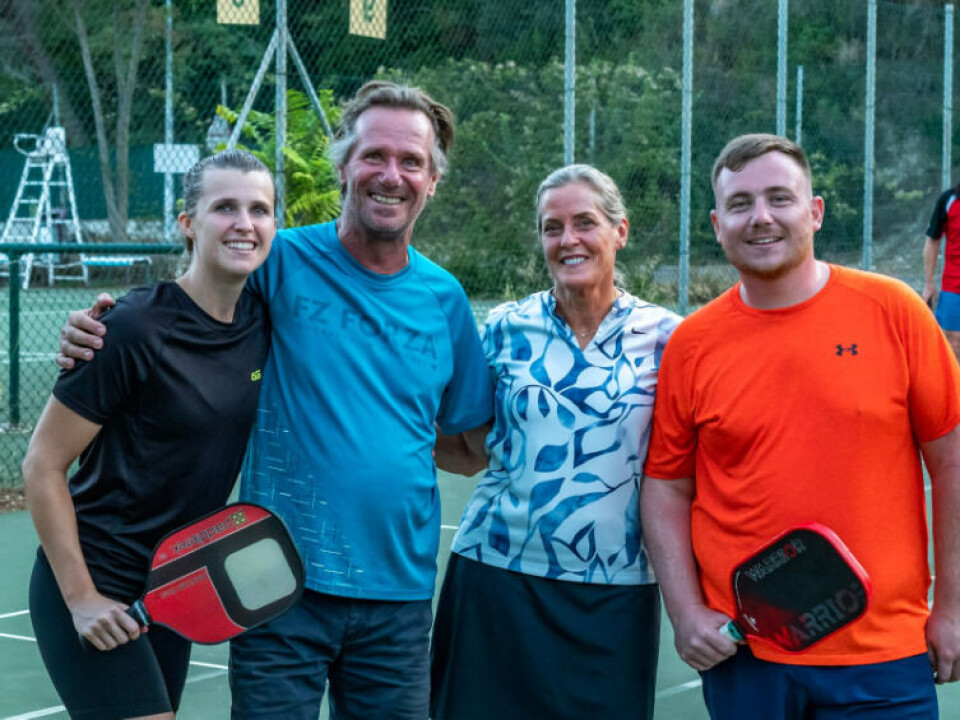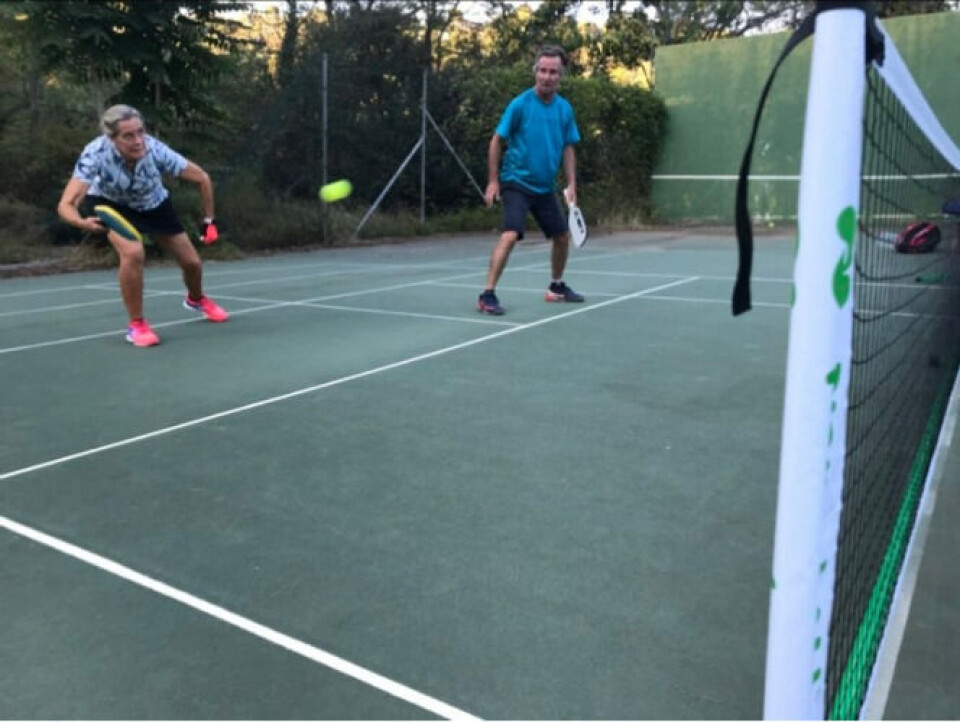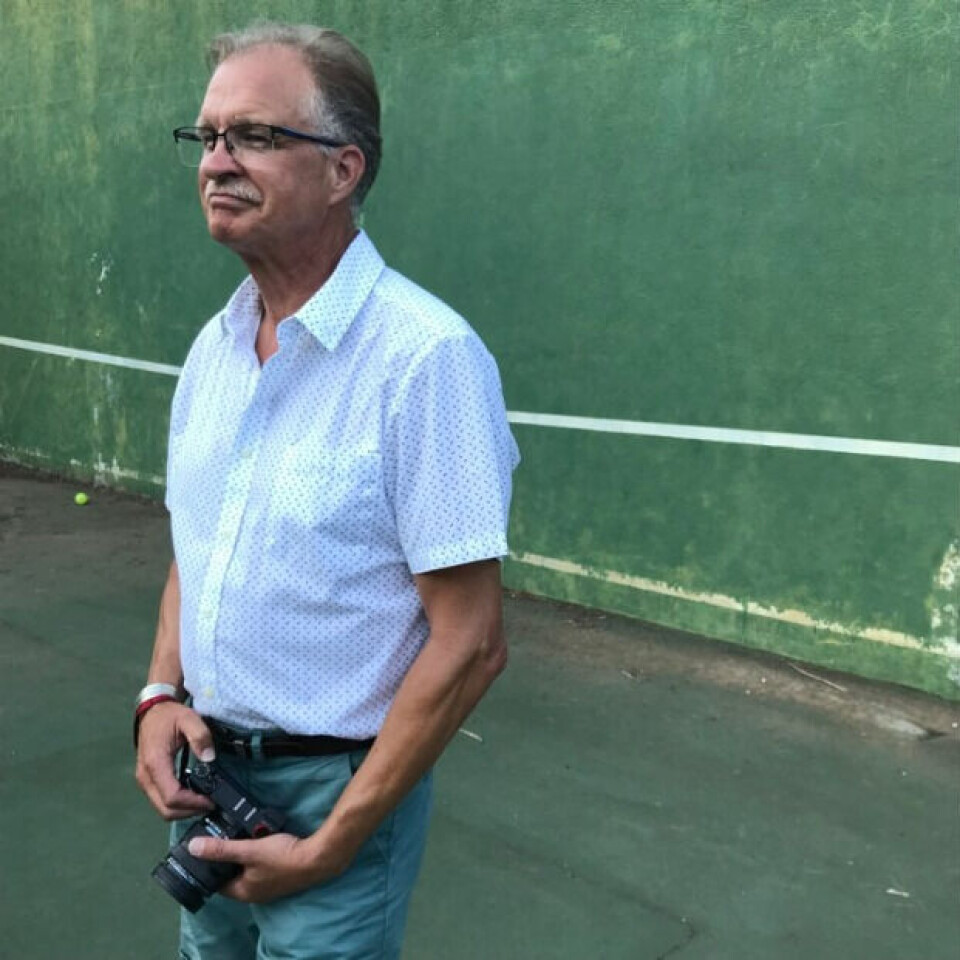-
December events in France: art, fashion and the Titanic
Explore Gustave Courbet's masterpiece at Musée d’Orsay, 1920s fashion at La Piscine, Picasso Museum's expansion, and the Titanic exhibition in Lyon
-
Vibrant Montpellier's festivals, beaches and year-round events
From Coeur de Ville en Lumières to Montpellier Danse, plus fabulous beaches, the city is a perfect getaway
-
Montpellier, a cultural hub with historic universities and diverse museums
Experience the city's diverse heritage and artistic offerings, featuring top museums like Musée Fabre
Calling all pickleball fans: help grow the US craze in France
Could enthusiasm from American expats help overcome marketing and cultural hardships here? This week is a big one for the sport in France

It is hard for Cicely Hand to refrain from speaking about pickleball, her enthusiasm is so contagious.
The 69-year-old Bay area raised woman, who has been splitting her retirement with 10 months in Nice and two in the United States since 2018, is all in for what is labelled the “fastest growing sport in America”.
A former TV news anchor, Ms Hand has not lost interest in news, reading all of what is written on pickleball from The Atlantic to TheNew York Times to the Wall Street Journal.
Pickleball is the newest and trendiest form of tennis-related sport, and it has grown massively popular among Americans during the Covid period. It is played in singles or doubles on a surface a fourth the size of a tennis court, using paddles and a perforated, light-weight plastic wiffle ball. It was created in 1965 in Washington state.
The sport landed in France around the mid-2010s.
Ms Hand and her husband David Wagoner, 67 and a former web design consultant, were lucky to be among the first players to obtain a pickleball membership at Trinité-Nice, one of the eight listed French associations which have picked up the sport.
The couple has found regulars often say that pickleball is fun to play, easy to understand, cross-generational, not too tiring and great for building a community.
“I feel less afraid now about making mistakes in French,” said Ms Hand, praising the players which – she said – have been thoroughly welcoming ever since they joined, despite their relatively modest proficiency in French.
Pickleball comes with its own unique vocabulary.

Cicely Hand and Bruno Dollet playing in the ‘no-volley’ zone. Credit: Théophile Larcher
You ‘dink’ in the ‘kitchen’, a tactic where players smash the wiffle ball into the narrowest area of the field. The two other parts are called the ‘no-volley zone’ and the ‘baseline.’
Some words translate easily into French, while others keep their English form, helping Ms Hand understand short word orders in French from coach Bruno Dollet, the president of Pickleball Trinité-Nice.
To win, players must reach 11 points, with a two-point margin required in the case of a draw at 10.
When Ms Hand plays, she cannot prevent herself from foreseeing the financial potential of extending pickleball to the nine empty courts at the club.
Some 45 pickleball games could be arranged if they were maxed out. At €10 per person for two and a half hours, the deal is a no brainer for Ms Hand.
But this is where Ms Hand’s enthusiasm may hit a brick wall. Pickleball has a marketing and cultural problem in France.
From three to ten years late
While the United States has Dreamland, the 64 acres of pickleball courts built in Dripping Springs, Texas, by millionaire Steve Kuhn, France thrives with 950.000 licensed tennis players.
The problem is that France only has an average of 1.3 tennis courts per town, and most are empty during off-peak hours.
While America has Benjamin Johns – who was offered a house in Dreamland in the hope of promoting pickleball – Tyson McGuffin and Frank Anthony Davis, France has Jocelyn Devilliers.
The issue here is that he began and built his pickleball career…in the United States.
While America counts Leonardo Di Caprio and Stephen Colbert among the dozens of high-profile celebs who have jumped onto the pickleball frenzy, France does not enjoy this publicity.
Cyril Hanouna, one of France’s most prominent radio and TV presenters, plays ‘padel’, the hottest racket sport in Europe right now, but not pickleball.
While American neighbours feud over public nuisance lawsuits from the sound of the ball thwacking on the private tennis court they built in the backyard, French homeowners are busy building swimming pools.
In America, pickleball players are seen as worthy of big venues, however their French counterparts are seen as wannabe tennis players having downsized their dreams.
Ask Théo Platel, winner of several medals with Pickleball Trinité-Nice and a once promising tennis player forced to stop by an injury; he would tell you instantly that his pickleball success is seen as less impressive. His brother Julien – another promising pickleball player – agrees, saying that players are sometimes mocked for having switched from tennis to pickleball.
Pickleball is from three to 10 years late arriving in France in comparison to the United States, depending on who you ask at Pickleball Trinité-Nice.
‘Paris is still terra incognita’
Ms Hand and Mr Wagoner are, however, right where you need to be if you want to wiffle the ball. Indeed, pickleball in France dinks mostly south.
It all started when Belgium-native Pierre Obozinski, 81 and the founder of the Unify Pickleball (UPTF), decided to create the first association in Pays de Fayence (Var) in 2015 after returning from a trip in Canada where he learned about the sport.
An American expatriate – who has now left France – created the second in Chamonix. It was only a matter of time before Pickleball Trinité-Nice gained ground, renting a ten tennis court facility on the northern hills of Nice.
French pickleball associations were united under the "Pickleball France" banner (, the name of the National Federation who is developing the sport and makes its name familiar in France, but players seem to agree that PF needs to be included within a bigger French federation to give the sport greater funds, accessibility and notoriety.
Most have in mind the relatively sluggish growth of racquetball, another tennis-like sport that never lived up to the hype after having chosen to create its own federation.
Pickleball players argue, however, over whether they should become part of the Fédération française de tennis (FFT) or the Fédération française de badminton (FFB.)
Covid has slowed the sport’s growing popularity and Mr Obozinski is now looking for a second wind as he tries to establish it in Paris, its large reservoir of anglophone immigrants and tennis facilities.
“Paris is still terra incognita for pickleball,” he said, adding that he has received between 20 and 30 requests from Americans in Paris about pickleball games over the last five years.
He is nearing the French capital, however, having signed a partnership with the Omnisports Sannois sports facility in Sannois (Val-d'Oise), a town 40 kilometres north west of Paris.
Toward the French Open
All eyes are now turning to the second edition of the French Open Pickleball Championship at Saint-Raphaël Country Club in Saint-Raphaël (Var) from August 25 to August 28.
Some 26 Americans, 15 Britons, five Canadians and four Australians are listed among the 205 participants, which also include Ms Hand. The first edition involved 120 participants.
Mr Wagoner – who cannot play because of a shoulder injury – will serve as the unofficial photographer for the tournament.

David Wagoner watching his wife training. Credit: Théophile Larcher
Ms Hand will play along with Sylvain Platel, the father of Julien and Théo. She said she would like to reach the quarter-final. But she secretly wants to win.
“Ms Hand is the type of person we need to develop the sport in France. The main problem is language barrier right now,” said Cyril Dirand, the organiser of the tournament and a PE teacher.
Read more
US tennis icon Billie Jean King to be awarded French Légion d'honneur
French golf course holes cemented over by climate activists
























